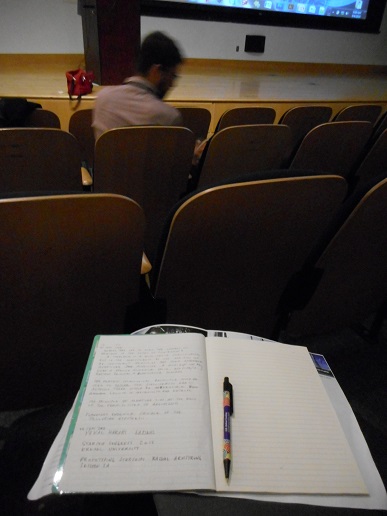Starship Congress 2015
6 September 2015
Sunday
The events of Starship Congress 2015 at Drexel University in Philadelphia have now wrapped up. September 4th and 5th were busy days full of attending sessions and interactions with other participants. After the first day of events I gave a partial rundown on events on Paul Carr’s The Unseen Podcast in Episode 22: Report from Starship Congress. I have not yet had time write up my experiences of the congress in detail. I also did not have time to take in any of the historic sights of the city, though the weather in Philadelphia has been quite nice.
The organizers of Starship Congress — primarily Andreas Tziolas and Mike Mongo of Icarus Interstellar, but of course many others contributed to the effort — had chosen Drexel University as the venue for Starship Congress 2015 because the university hosts an active student chapter of Icarus Interstellar. The organizers emphasized that they hoped to build on the student participation in the previous Starship Congress in 2013 (cf. Day 2, Day 3, and Day 4), and this proved to be a wise decision. Student engagement was impressive. The students not only brought energy and enthusiasm, they also showcased considerable ingenuity and hard work in their presentations of their projects.

David Evinshteyn of the local Drexel chapter of Icarus Interstellar gives a presentation of their Zeus starship.
On the afternoon of the second day of the event I gave my presentation, “What kind of civilizations build starships?” (Most of the conference was streamed live on Youtube, and you can watch the entirety of my presentation there.) The organizers had generously allowed me 45 minutes to speak, so I had time to develop some points in detail. Over the past few years, and in other presentations, I have emphasized that we have no science of civilization. I took this point further in this presentation in attempting to show how discussion of civilization to date has been in terms of folk concepts, and suggested ways in which the study of civilization might be developed employing fully scientific concepts.
I drew on the work of Carnap and Hempel, so I was employing what might be characterized as a rather conservative philosophy of science, going back to the logical empiricism of the mid-twentieth century. This approach to the science of civilization might well be pursued with more recent resources in the philosophy of science, but I strongly feel the need to try to start with a blank slate, as it were, and to re-think civilization from the ground up from the perspective of systematically articulating concepts of civilization that can transform the study of civilization into a rigorous science.
Because of my preparations for my presentation and the congress I have not been posting much here. I hope to write more on Starship Congress 2015, and some of the ideas I encountered will eventually find themselves into further posts.
. . . . .
. . . . .
. . . . .
. . . . .








